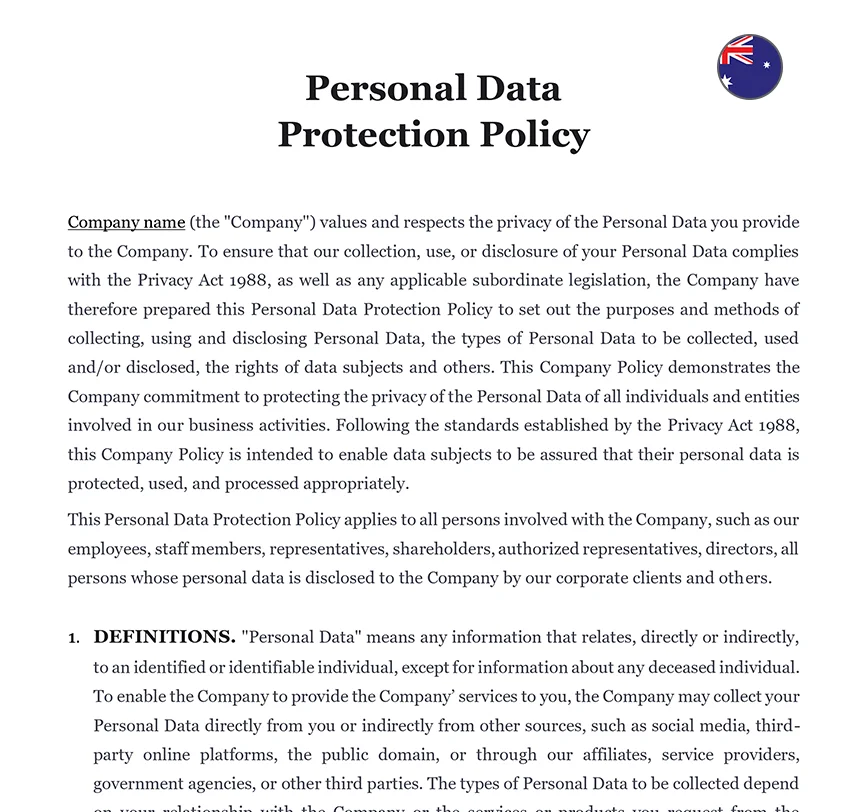Ready to use legal template
Drafted by experienced lawyers
Compliant with Australian law
Ready to use legal template
Drafted by lawyers
Compliant with Australian law
Home › Intellectual property › Personal data protection
Learn more about Personal Data Protection in Australia
Personal data protection refers to the legal and technical measures taken to safeguard individuals’ personal information from unauthorized access, use, disclosure, alteration, or destruction. In Australia, personal data protection is governed by various laws and regulations aimed at ensuring that organizations collect, process, and handle personal information in a manner that respects individuals’ privacy rights.Our easy-to-edit templates streamline the document preparation process, ensuring that you have professionally crafted documents at your fingertips, ready to be customized to your unique needs.
Table of contents
-
What does the personal data protection act (PDPA) regulate in Australia?
-
How does the PDPA protect individuals' personal data in Australia?
-
What are the obligations of companies and organizations under the PDPA?
-
What are the rights of individuals under the PDPA in Australia?
-
How are the PDPA and its regulations enforced?
-
What penalties can be imposed for non-compliance with the PDPA in Australia?
-
What is the role of a Data Protection Officer (DPO)?
What does the personal data protection act (PDPA) regulate in Australia?
The Personal Data Protection Act (PDPA) in Australia plays a crucial role in safeguarding individuals’ privacy rights and regulating the handling of personal data by organizations. The PDPA sets out clear guidelines and standards for the collection, use, disclosure, and management of personal information, aiming to ensure transparency, accountability, and fairness in data processing activities.
Under the PDPA, organizations are required to comply with specific principles and obligations when dealing with personal data. These include obtaining consent from individuals before collecting their personal information, limiting the purposes for which personal data can be used, implementing appropriate security measures to protect personal information from unauthorized access or disclosure, and providing individuals with the right to access and correct their personal data.Additionally, the PDPA imposes obligations on organizations to notify individuals of the purposes for which their personal data is being collected, the consequences of not providing requested information, and the rights available to them in relation to their personal information. This helps empower individuals to make informed decisions about the use of their data and exercise control over their privacy.
Overall, the PDPA serves as a comprehensive framework for data protection in Australia, promoting trust between individuals and organizations by ensuring that personal information is handled responsibly, ethically, and in accordance with established privacy principles.
How does the PDPA protect individuals' personal data in Australia?
The PDPA provides robust protection for individuals’ personal data in Australia by establishing clear rights and obligations for both data subjects and data controllers. Key provisions of the PDPA that safeguard individuals’ privacy include:
| ➤ Consent: Organizations must obtain individuals' consent before collecting, using, or disclosing their personal information, except in specific circumstances where consent is not required. |
| ➤ Purpose limitation: Personal data should only be collected for specified, legitimate purposes, and not further processed in a manner incompatible with those purposes. |
| ➤ Data minimization: Organizations should only collect personal data that is necessary for the purposes for which it is being processed and should not retain it for longer than necessary. |
| ➤ Security safeguards: Data controllers are required to implement appropriate technical and organizational measures to protect personal data against unauthorized access, disclosure, alteration, or destruction. |
| ➤ Right to access and correction: Individuals have the right to request access to their personal information held by an organization and to request corrections or updates to ensure its accuracy and completeness. |




